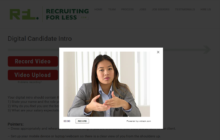
Six Things NOT to Say in a Job Interview
Now that you are searching for a new job, finally getting through to the first interview can feel like a touchdown. You’ve been working with a recruiting organization or agency to help you get placed, your resume is polished and made it to the top of the pile, you’ve successfully completed your first telephone interview, and now you’ve been invited to meet at the interviewer’s office. However, many candidates end the process in the first interview because of some ill-conceived statements. Putting your foot in your mouth is never a good idea, most particularly when a potential job is on the line. Here are some verbal landmines to avoid when navigating your job interview:
“My apologies for being late.”
Don’t be late. Your interviewer is left wondering if you’ll be late to your job each day. It’s an immediate black eye. It can be perceived as both disrespectful to the interviewer’s time in their busy day, and irresponsibility and disorganization on your part. In our day and age of GPS, you should be able to plan the night before what your travel time is going to be. Figure it out and add 20 minutes. Here’s a simple rule for every job interview: arrive early and wait outside until 5-10 minutes before the interview begins. Give yourself plenty of time in case you hit unexpected delays. Additionally, don’t walk in earlier than 5-10 minutes in advance of your meeting. It doesn’t show proactivity; it adds unnecessary pressure on the interviewer. They might feel they have to rush through their current meeting to accommodate you.
“My biggest weakness is I am a perfectionist.”
This might have been a great answer 20 years ago – today it just seems like you read a clichéd book on people skills. Toss that in the trash, alongside “I work too hard.” Interviewers expect this type of answer, so don’t use it. They are looking to evaluate how introspective you are. Since everyone has faults, they want to know if you are aware of yours. They also want to know if you’ve already taken action to improve on it, and what progress you’ve made. Instead of saying, “I take on too much work,” you might say, “I struggled with delegation in my last role. Once I identified that, I set up a system of clear milestones and regular accountability with my direct reports. We both knew they were on track and my management style improved because of it.”
“My current boss is a jerk.”
Absolutely NEVER speak badly about your previous boss or company. It makes you come off as unprofessional at best, and at worst a bitter complainer. The interviewer might begin to wonder if you are difficult to work with. Remember, you are also being interviewed for your character. If you would speak badly about your previous boss, there is a good chance you’ll speak negatively about your future one. It’s expected that everyone has had a boss that they didn’t connect with in their work history. If you truly had a terrible experience, spend some time in advance thinking about how to express what you learned from the situation and how it has made you a better employee.

“I’m the best candidate for the job.”
Unless you’ve personally screened all the other candidates (which you haven’t), you can’t possibly know that to be true. Saying it doesn’t demonstrate anything other than arrogance and staggering naivety. It doesn’t matter that you think you’re the perfect match for the job. The next resume might have all your qualifications plus the three bonus skills you are lacking. You may believe this statement displays confidence (which is a desirable quality), but it goes a step too far.
“How much vacation time do I get?”
While this is something you might be interested in knowing, you do not ever want to bring that up in the interview. Leave that for the final details of negotiation. Your focus in the interview needs to be conveying how effectively you will help the company hit its goals, not how you will carve out time to blow off steam. Don’t paint for them a mental image of your unattended desk collecting dust while you are away having fun. You want to paint a picture of yourself sitting at your desk, accomplishing tasks, helping the company make money, and helping the hiring manager get a big pat on the back for choosing YOU to bring onto their team.
“I have no questions for you.”
Many interviewerswill conclude by asking if you have any questions for them. Asking questions in an interview sets you apart from other candidates because you are showing an interest both in the job and the company itself. It gives the interviewer the opportunity to share more about the job and the organization, which is often enjoyable for them to do. Be careful not to ask generic questions that could have (and should have) been answered by searching their website the night before. By asking questions, you are also demonstrating your own critical thinking and highlighting what is important to you. “How would you describe your corporate culture?” or “If I get the job, how would you measure my success in the role?” are good starting points. The best candidates are not just promoting themselves to their prospective employer – they are looking for a company they will enjoy working with.
- 29 Sep, 2016
- Posted by r3cruiting4l3ss
- 0 Comments


COMMENTS